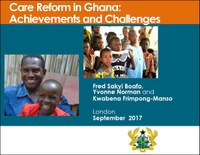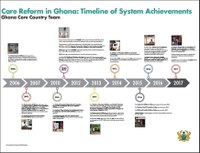Alternative Care in Ghana
Ghana has a deep cultural tradition in which children without family care are cared for by extended family or community members. In 1997 there were only 10 residential homes for children. Yet by 2006, the number of children living outside of family care had grown and there were an estimated 138 residential homes for children. Efforts to reunify and reintegrate children from these homes back in to family-based care is a priority. By 2017, over 1,577 children previously living in residential care had been reintegrated back to their parents or extended family members (Ghana Country Care Profile, 2015).
In 2007, the Ministry of Gender, Children and Social Protection, with support from the United Nations’ Fund for Children (UNICEF) and OAfrica, established the Care Reform Initiative (CRI) in Ghana. The primary objectives of this initiative are to promote family-based care, deinstitutionalize and reintegrate children back into family-based care, prevent unnecessary child-family separation, and strengthen gatekeeping measures[1] and standards for continuing residential care homes. Since establishing the CRI, the government has turned down approximately 40 new applications for residential homes, revised national legislation to better accommodate care reform, developed a new Child and Family Welfare Policy, developed regulations for adoption, released national standards for residential care homes, supported a new foster care program—and more. So far, a total of 354 foster parents have been identified, 100 of whom have been screened and trained.
Although progress is being made, much more work needs to be done to ensure children are protected. The government is working in partnership with UNICEF and civil society organizations to implement a national policy, improve monitoring and evaluation, build the capacity of the workshop, change negative social norms related to care reform, and address other national priorities.
MEASURE Evaluation, funded by the United States Agency for International Development (USAID), began supporting this work in Ghana in April 2017. Our task is to strengthen the capacities of government partners to assess, address, and monitor child care reform, in line with the United Nations’ Guidelines for the Alternative Care of Children.
MEASURE Evaluation is supporting the government partners to:
- Provide leadership in implementing a structured assessment of national childcare reform systems and strategies, using a standardized framework or tool
- Identify gaps and continuing needs in childcare reform
- Develop plans to address priority needs
- Establish monitoring indicators and systems for regular assessment of progress and monitoring of results against country plans for childcare reform
[1] “Gatekeeping in this context is the process of referring children and families to appropriate services or care arrangements with the aim of limiting the number of inappropriate placements. Gatekeeping is an essential tool in diverting children from unnecessary initial entry into alternative care, and reducing the numbers of children entering institutions” (Better Care Network website, retrieved November 16, 2017).














